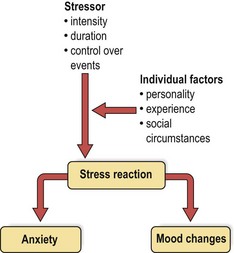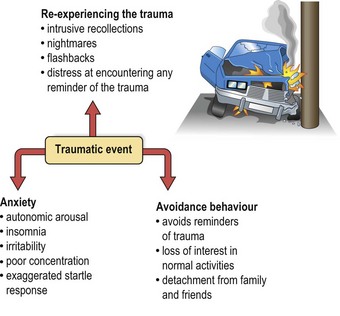Reactions to stress
It is normal to react to stress in an emotional way. The disorders described here are considered to be abnormal reactions to stress either because the reaction is extreme or prolonged, or because it prevents the individual from functioning at home or work in their usual way. An abnormal reaction to stress may occur because of the nature of the stressor, or the way the individual copes with it, and often a combination of the two (Fig. 1). The stressor may be unusually intense, such as a combat situation or a natural disaster. Less intense events may be made more stressful by a long duration, or by a lack of control over events. Individual coping abilities are influenced by personality characteristics and previous experiences of stress and coping strategies. Stressful events are generally more difficult to cope with if they arise against a background of chronic social difficulties and lack of social supports.
Post-traumatic stress disorder (PTSD)
PTSD occurs in response to an extremely stressful event, beyond the realms of usual experience, that would be distressing to anybody. This might include a serious accident or assault in which the life of the individual or their family is threatened, or a man-made or natural disaster. There is often a delay of days or weeks before the symptoms begin, although generally the disorder is established within six months of the stressor and runs a chronic, fluctuating course. The range of symptoms that may be found are shown in Figure 2 and, of the three groups of symptoms, it is recurrent thoughts about the traumatic event that differentiate PTSD from other anxiety and mood disorders. Vivid memories come to mind repeatedly despite attempts to block them out, either during waking hours or as nightmares during sleep, and these are often accompanied by the emotions that were experienced at the time of the trauma. Very intense and distressing flashbacks can occur, during which it feels to the affected person that the trauma is happening or about to happen again. Depressive disorder is a common complication, and alcohol or illicit drugs may be abused in an effort to cope with the symptoms.
< div class='tao-gold-member'>
Stay updated, free articles. Join our Telegram channel

Full access? Get Clinical Tree





